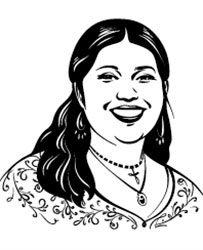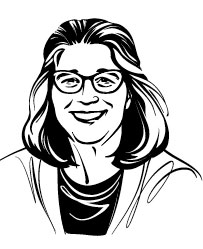The Pulteney StreetSurvey
Parallels
memorable courses, healthcare insights and serving others across the generations

NATALIE SANDOVAL ’25
Pre-med STEM Scholar
Summer researcher on family planning in Rwanda through Western Washington University
Volunteer in AfghanistanMember of Posse, Latin American Student Organization and Theta Phi Alpha sorority
Major: Sociology
Hometown: Los Angeles, Calif.

DR. KRISTIN CROSBY ’73
Family Practice Physician
Volunteer in Afghanistan supporting maternal-child health
M.D. from Virginia Commonwealth University, M.B.A. from University of Denver and M.P.H. in International Public Health from University of Washington
Major: Anthropology
Hometown: Bellingham, Wash.
Who or what inspired you to study medicine? NS: My Tía Corrin, who is a nurse in El Salvador. I will always admire her, especially for taking care of my late grandfather while he was fighting skin cancer. KC: The Biology of Perception course at HWS, after childhood years reading Reader’s Digest articles such as “I am Joe’s heart.”
Favorite or most memorable course at HWS? NS: My Geoscience independent study on gender diversity and representation with Professor Arens. KC: The Anthropology class on kinship and family relationships with Russell Judkins.
Favorite place(s) on campus? NS: The Adams Intercultural Center, the library and the gym. KC: Houghton House.
How has your perspective as a non-STEM major influenced your view of medicine? NS: The medical field can be disconnected from reality as it tries to find instant, simple fixes. But as I have learned and experienced, health issues are complex, affected by many aspects of one’s life. KC: My Anthropology major was of critical importance since I would have my whole life to study medicine but “only” four years of college to learn about and understand my patients’ different backgrounds.
What are some key global challenges regarding family medicine? NS: We must be aware of different practices, needs, cultures and experiences, as well as technical challenges: accessibility, affordability and simply having enough staff. KC: The widespread lack of access to basic health care, and the epidemics of infectious disease coupled with the lack of effective vaccines against malaria, TB and HIV/AIDS.
What are you most grateful for? NS: Family, friends and mentors. KC: My three healthy children and 47 years of a solid marriage.
Your most rewarding accomplishment? NS: Becoming a Posse Scholar. KC: My trips to Afghanistan.
Best piece of advice you’ve received? NS: Ask for help and seek out resources. KC: From my dentist while I was home from college: “Go to medical school — you can do it!”
What motivates you? NS: Knowing that whatever I do will make my family proud. KC: To be of service to others and make the world a better place when I leave than it was when I arrived.
